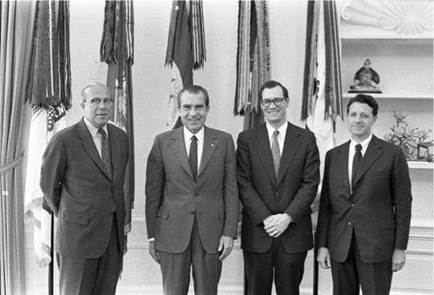A New Office of Management and Budget
Following up on another of the Ash Council’s recommendations, the president also proposed to create within the Executive Office of the President an Office of Management and Budget (OMB) that “would be the President’s principal arm for exercise of his managerial functions. . . The Domestic Council will be primarily concerned with what we do; the Office of Management and Budget will be primarily concerned with how we do it, and how well we do it.” Although functions of the Bureau of the Budget (BOB) remained the core element of the new OMB, responsibilities such as overall management of the executive agencies and evaluating their performance were added to the organization’s charter. In the BOB, only the director and deputy director were chosen by the president. In the new OMB, there would be in addition several presidentially selected associate and assistant directors; by placing political appointees in these positions, the intent was to more effectively link budget choices to Nixon’s policy and political priorities.3
Chosen to be the first OMB director was George Shultz, at that point Nixon’s secretary of labor. Shultz held a doctorate in economics and had come to the Nixon administration from the University of Chicago, where he had been dean of the business school. Shultz was a steady personality and was one of the few cabinet members who had established a good relationship with President Nixon during the administration’s first year; in his new position, he soon became part of the president’s inner circle of advisers. To clear the way for appointing Shultz, BOB Director Robert Mayo in June 1970 was named counselor to the president, a position with no substantive responsibility. Recognizing that he had been shunted aside, Mayo resigned in July to become the president of the Federal Reserve Bank of Chicago.
Selected as OMB deputy director with primary responsibility for budget issues was Caspar “Cap” Weinberger, who was chairman of the Federal Trade Commission, a regulatory agency. Weinberger had served as California governor Ronald Reagan’s budget director before coming to Washington, and his budget-cutting fervor there had earned him the sobriquet “Cap the Knife.” The OMB assistant director for energy, natural resources, and science, one of the new political appointees, was Donald Rice. He came to OMB from the Department of Defense, where he had been responsible for cost analysis, manpower and logistics requirements, and budget planning. Shultz, Weinberger, and Rice would from the time they took office in mid – 1970 become key actors in the space policy process.
|
President Nixon with his new budget team: (l-r) George Shultz, President Nixon, Donald Rice, and Caspar Weinberger. (National Archives photo WHPO 8904-11) |











